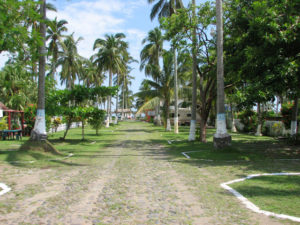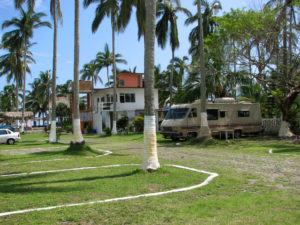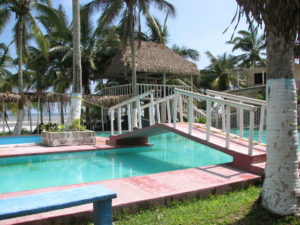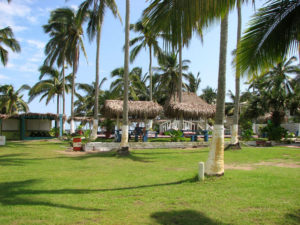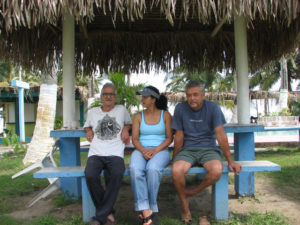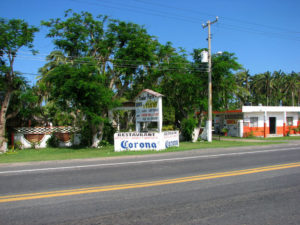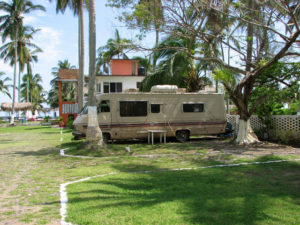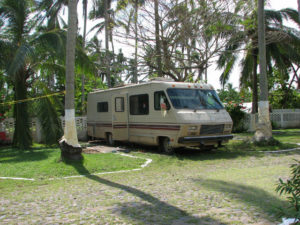Wild Bill is a seventy-six year-old expatriate enjoying his motor home and life in relative seclusion at Quinta Alicia Trailer Park on the palm covered coast of Costa Esmeralda, Mexico. Retired from both the military and a career in aviation management, Bill is a widower with five grown children. We sat at a concrete picnic table a hundred feet from the Gulf coast’s lapping waves with a steady breeze rustling the palms overhead. I asked how he and his RV came to settle in Mexico.
The former Vermonter, clad in sandals, slacks and tee-shirt, said, “About eleven years ago, I realized I’d been around the world and not seen anything.”
Wild Bill cured his dilemma by purchasing a small used Allergo. His consulting on aviation took him around the country. The motor home put him on the ground to enjoy the views along the way. In 2001, he made his first venture into Mexico via RV. That challenging and enchanting trip lasted a month and he lengthened his stay on each subsequent foray. The majority of his first ventures were solo trips, but he occasionally teamed up with others enjoying their motor home travels.
“Weren’t you scared driving a motor home in Mexico?” I asked.
Bill set his white cup down. “At first, Mexican driving scared me. However, as I learned the highway customs, the difficulties evaporated. Tell your readers to never, never, never give a left turn signal as they would in the States. The left turn signal is a sign to the driver behind you that the road ahead is clear for him to pass. For years, Mexico had virtually shoulder-less roads and that signal helped keep traffic moving. If you can’t naturally make the left, pull as far off to the right as possible and allow everyone to pass. When the highway is clear make your left.”
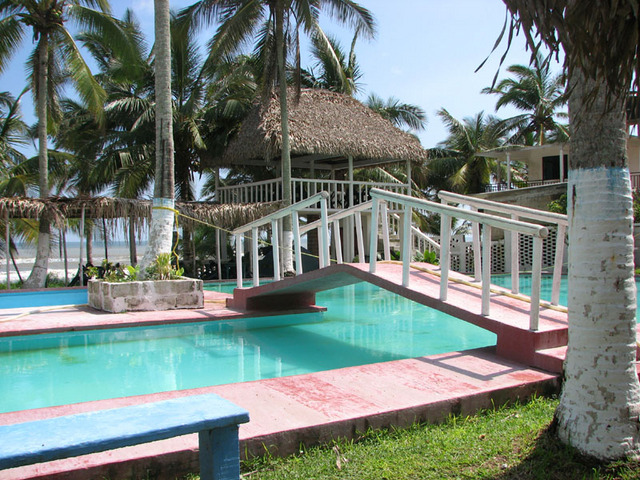
Wild Bill was in his element, a man who’d driven his motor home to almost every part of Mexico. He had great advice based on the common sense he’d gathered along the way. Many of the roads are narrow and virtually shoulder-less. That’s something American tourists have to realize. The other major problem new drivers face is the directional road signs and/or lack of signs. They’re in Spanish. Desviación (Detour) and Peligroso (Dangerous) are difficult at first. Topes are another road barrier the tourist must learn — elevated “speed bumps” in the road to slow drivers and save the expenses of signals or hiring traffic cops.
He camped at Quinta Alicia on Costa Esmeralda for the first time in 2002. The location was a perfect early stopping spot when visiting as he explored the majority of the country. In 2005, he decided to see how bad the summer season was and found it wasn’t as uncomfortably humid and hot as many people indicated. That settled it. Feeling safer in Mexico than anywhere in the United States, Wild Bill parked his bought-used, 1990 Pace Arrow, and made a new home in the type semi-tropical paradise so many dream of.
Wild Bill adds flavor to an already colorful local scene in a multitude of ways. He’s made many friends among the locals and become a fixture on the Costa Esmeralda landscape. A short walk takes him into the local village for shopping, or a quick bus trip carries him to larger nearby cities for serious shopping. With imperfect Spanish, Wild Bill accomplishes anything he wants, but at times values the anonymity this small Mexican subculture affords him.
I watched steam swirl from his coffee. Another hundred yards inland, it would compete with subtropical heat for primacy but, where we sat, his cup was the hottest thing going. I’d noticed two Mexican flags flying from Bill’s Pace Arrow and asked about them.
The ocean breeze stirred his white hair as he took a slow sip of coffee. “I fly the first one to show empathy for the Mexican people. I added the second to fool new American tourists so they don’t bother me,” he replied.
Having visited Mexico almost yearly since 1971, I knew exactly what Wild Bill was saying, but sat back to fully hear his thoughts.
“That’s not in all cases, of course,” he continued. “A great many I enjoy talking with. But those who only want to verify their own opinions on Mexico or don’t bother trying to understand the culture and history aren’t generally people who will get the most out of their trip or make one want to talk with them. We get quite a few RVers during the motor home season, November through May, and I’ve also found people who are unsatisfied with their caravan experience. The caravan sometimes puts people together whose personalities don’t fit and can be limiting when someone wants to linger a bit longer. But we’ve had sixteen or seventeen big motor coaches camp here at a time.
Bill swirled his coffee and I asked, “What about problems with the police on the highways?”
Bill nodded and described the four levels of police in Mexico. The tránsitos, or traffic police are the ones to be somewhat concerned with. They’re most notable because of their brown uniforms and the fact they don’t carry guns. They’re paid very little and some may subsidize their salary with traffic stops. I never pay a bribe, but I know the culture better than most Americans. There are three things to keep in mind if one stops you. Never be intimidated. You might even take their picture as they exit their car. If they press the issue concerning a ticket, tell them ‘Take me to the station.’ These steps usually make them back off but if you have one that doesn’t appear to be backing off, you might want to pay a few dollars to be on your way.
There’s also a form put out by the Mexican government. It’s in Spanish but can be useful. The form has the appropriate questions asking what is the offense, etc. Fill the form out during the stop and ask the cop to sign it. The majority of the tránsitos don’t want such a stop on record and back off.
Intrigued by his insights I asked, “Beyond your primary advice on road signs and different highway customs, what would you warn the new-to-Mexico motor home driver about?”
“Avoid narrow streets at all costs,” he said. “If you find yourself on one and have someone with you, have them get out and help you navigate through. But try to avoid narrow streets. Pedestrians darting out and cars pulling into traffic are far worse here than in the States. They don’t realize it’s harder to stop a motor home than a car, so the driver must be extra cautious in city traffic. It’s best to park a motor home on the edge of town and walk in or take a taxi. Taxis are very cheap here, and it saves the worry of ending up trapped on a narrow street.”
I could tell Wild Bill was recalling his own experiences, and asked if he’d ever had any problems.
“My only accident traveling Mexico was in Oaxaca,” he replied. “There were two lanes of traffic each way, with the inside lane used for parked cars. I was traveling with perhaps eighteen inches to spare on each side between the parked cars and the vehicles on my left. I couldn’t have been going fifteen miles-per-hour when a guy pulled in front of me. I took off his driver’s side rearview mirror.” He shook his head recalling the incident. “In minor circumstances, like this, you never want to call the police. They’ll have both drivers follow them to the police station where both vehicles are impounded until the details are worked out. One lady I know had a more serious accident and her RV was impounded for several days. She made herself at home in the impound yard and lived in her motor home until the insurance companies worked everything out.
“In my case, the guy and I were in the same predicament and wanted to work things out without the cops. We started negotiating. He wanted a hundred dollars. I countered with a fifty dollar offer and he settled for that. Just make sure you have Mexican insurance.”
Some distant birds caught my eye and I changed the subject to refocus on practical aspects of RVing. “When you’re traveling, have you ever had problems with sewage disposal or finding a camping spot?”
“Never. The campgrounds cover those problems. However, when I was first traveling and learning my way, I discovered I could park overnight at most Pemex stations. That’s something the new tourist should keep in mind if caught traveling late. Give the security guard ten or twenty pesos (one or two dollars) to keep an eye out for you and your mobile home. That alleviates any concerns.”
“How about breakdowns?” I asked. “Have you had any serious problems?”
“Good point,” Wild Bill said, shifting positions on the cement bench where we sat. “People will want to know about that. My brakes went out in the middle of nowhere. I was ten miles from the closest town but a couple in another motor home was traveling with me at the time. We had CBs, which helped. They were towing a car and we unhitched it for his wife to drive. He drove slowly and I followed close behind him and he warned me of any impending obstacles or problems. We stopped at a couple of roadside mechanics, who are usually very good, but this was too much for them. None of them charged anything for looking for the problem. We finally reached a larger shop in the city. I had a broken brake line and had lost all the hydraulic fluids. I was fearful of the cost, but they did everything for a quarter of what it would have cost in the States. Another time I had to have the air conditioner recharged. I don’t recall the cost but it was negligible.”
I spent a great morning with Wild Bill, living his life of Riley if only temporarily. I can only hope, should you decide to try Mexico, your path wanders into Alicia Trailer Park and you encounter this inquisitive gentleman and expert on RVing in Mexico. The ocean breeze is perfect for great conversations. If you have questions in the meantime, please e-mail me at [email protected] or the editor, and your e-mail will be forwarded to Wild Bill.
Alicia Trailer Park rates at press time ran from approximately $5.60 USD per night, $36 per week and $125 a week for one person to $11.20 a night, $64 a week and $232 per month for two people.

